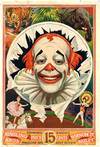
The Astonishing Life of Octavian Nothing, Traitor to the Nation, Volume II : The Kingdom on the Waves
by Anderson, M. T
- Used
- Condition
- Used - Very Good
- ISBN 10
- 0763646261
- ISBN 13
- 9780763646264
- Seller
-
Dunfermline, Fife, United Kingdom
Payment Methods Accepted
About This Item
Candlewick Press. Used - Very Good. Ships from the UK. Former library book; may include library markings. Used book that is in excellent condition. May show signs of wear or have minor defects.
Synopsis
M. T. Anderson is the author of several novels for young adults, including the much-lauded THE ASTONISHING LIFE OF OCTAVIAN NOTHING, TRAITOR TO THE NATION, VOLUME I: THE POX PARTY, winner of the National Book Award, and FEED, which won the LOS ANGELES TIMES Book Prize and was a finalist for the National Book Award. M. T. Anderson lives in Cambridge, Massachusetts.
Reviews
(Log in or Create an Account first!)
Details
- Bookseller
- Better World Books Ltd
(GB)
- Bookseller's Inventory #
- 8644646-75
- Title
- The Astonishing Life of Octavian Nothing, Traitor to the Nation, Volume II : The Kingdom on the Waves
- Author
- Anderson, M. T
- Book Condition
- Used - Very Good
- Quantity Available
- 1
- Binding
- Paperback
- ISBN 10
- 0763646261
- ISBN 13
- 9780763646264
- Publisher
- Candlewick Press
- Place of Publication
- Somerville, Massachusetts
- This edition first published
- 2009-10-13
Terms of Sale
Better World Books Ltd
30 day return guarantee, with full refund including shipping cost for up to 30 days after delivery if an item arrives misdescribed or damaged. Please keep in mind that because we deal mostly in used books, any extra components, such as CDs or access codes, are usually not included. CDs: If the book does include a CD, it will be noted in the book's description ("With CD!"). Otherwise, there is no CD included, even if the term is used in the book's title. Access Codes: Unless the book is described as "New," please assume that the book does *not* have an access code.
About the Seller
Better World Books Ltd
Biblio member since 2009
Dunfermline, Fife
About Better World Books Ltd
Better World Books generates funding for literacy charities through the sales of second-hand books. Our current partner charities in the UK are READ International, the National Literacy Trust, Room to Read. (Registered Charities no. 1128534, no. 1116260 and no. 1125803 and the National Adult Literacy Agency. Much of our stock is ex-library due to our close relationships with UK libraries. We offer a service that helps them keep their unwanted books out of landfill. All ex-library books will be marked as such in their individual listings. 99% of orders are dispatched within 24 hours and we offer a 100% money back guarantee if you are not completely satisfied.

